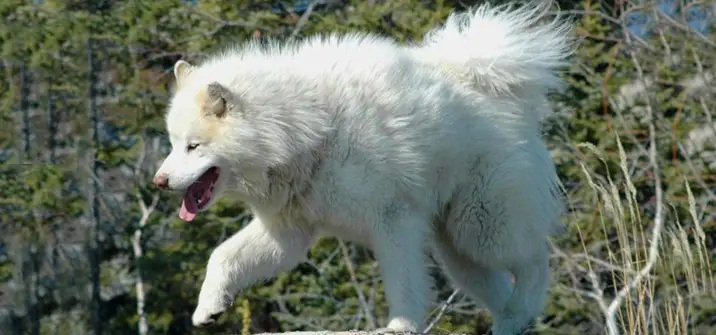The Canadian Inuit Dog(CID, also called Canadian Eskimo Dog (CED)) is the oldest and rarest remaining pure breeds of the North America. This large dog has its origin that dates back to about 4000 years. It is considered to be the descendent of Greenland dog. This is a multipurpose dog that was, and to some extent still is, used as hunter and sled dog in the Canadian Arctic by Inuit (Eskimo) people. The dog is used to hunt seals in the arctic region and it can detect presence of a seal from a long distance. It was also used to hunt bears as well as for a mode of transportation for Arctic people. It is a large dog that is more a working dog than a family and household pet. It stands between 23-28 inches and weighs between 66-88 lbs with female dogs shorter and lighter.
The Canadian Inuit Dog is a powerfully built, moderately sized dog with a thick neck and chest and medium length legs. Typical of the Spitz family of dogs he has a wedge-shaped head held high with thick erect ears. The eyes are obliquely set giving a serious appearance. The dog has a bushy tail carried up or curled over the back. Of almost equal height at the hips as at the withers, medium to large boned and well muscled the dog displays a majestic and powerful physique giving the impression that he is not built for speed but rather for hard work. During the winter the body is thickly clothed with an outer coat of straight or erect hair; below is dense underfur which enables the animal to easily withstand the rigor of high latitudes. A mane-like growth of longer hair over the neck and shoulder will appear on male specimens. The whole conformation of the Canadian Eskimo Dog should be one of strength, power and endurance balanced with agility, alertness and boldness. The female of the breed will usually have a shorter coat than the male and will always be significantly smaller than the male. Both males and females of the breed are known to have a rapid growth rate reaching working size around seven months. However, the maturing process extends to at least three years of age giving them a very majestic appearance. Puppies have often been described as miniature adults, with erect ears and a curly tail at the young ages between three to five weeks.
This dog is NOT recognized by AKC however it is recognized by ANKC, CKC, KC (UK) and UKC.


